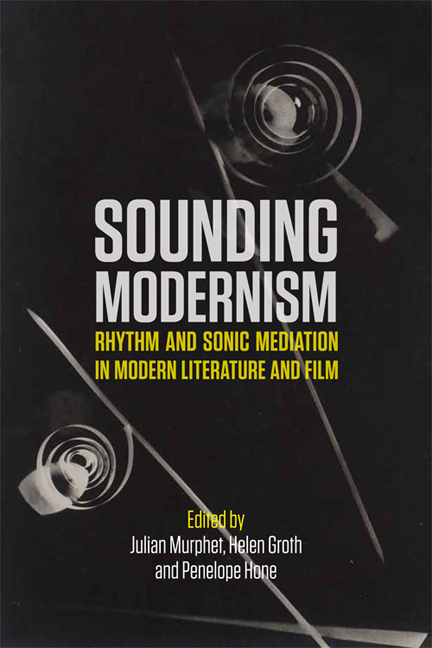Book contents
- Frontmatter
- Contents
- Acknowledgements
- 1 Introduction: Sounding Modernism 1890–1950
- Part One Writing Modern Sound
- Part Two Mediated Voices
- 4 Bottled Bands: Automatic Music and American Media Publics
- 5 How to Listen to Joyce: Gramophones, Voice and the Limits of Mediation
- 6 Sounding Region, Writing Accent: A. G. Street and the BBC
- 7 Partial to Opera: Sounding Willa Cather's Empty Rooms
- 8 Elliptical Sound: Audibility and the Space of Reading
- Part Three Difficult Voices
- Part Four Modern Rhythm: Writing, Sound, Cinema
- Notes on Contributors
- Bibliography
- Index
7 - Partial to Opera: Sounding Willa Cather's Empty Rooms
from Part Two - Mediated Voices
Published online by Cambridge University Press: 22 December 2017
- Frontmatter
- Contents
- Acknowledgements
- 1 Introduction: Sounding Modernism 1890–1950
- Part One Writing Modern Sound
- Part Two Mediated Voices
- 4 Bottled Bands: Automatic Music and American Media Publics
- 5 How to Listen to Joyce: Gramophones, Voice and the Limits of Mediation
- 6 Sounding Region, Writing Accent: A. G. Street and the BBC
- 7 Partial to Opera: Sounding Willa Cather's Empty Rooms
- 8 Elliptical Sound: Audibility and the Space of Reading
- Part Three Difficult Voices
- Part Four Modern Rhythm: Writing, Sound, Cinema
- Notes on Contributors
- Bibliography
- Index
Summary
Overtones
In her 1922 aesthetic manifesto, ‘The Novel Démeublé’, Cather argues that meaning inheres not in what's put on the page, but what's left out. The novel works by under-specification and by omission.
Whatever is felt upon the page without being specifically named there – that, one might say, is created. It is the inexplicable presence of the thing not named, of the overtone divined by the ear but not heard by it. How wonderful it would be if we could throw all the furniture out the window; and along with it, all the meaningless reiterations concerning physical sensations, all the tiresome old patters, and leave the room as bare as the stage of a Greek theatre, or as that house into which the glory of the Pentecost descended; leave the scene bare for the play of emotions great and little.
Fiction's spaces, though architectural, are meant to be filled by voices from elsewhere. The novel, for Cather, is a physical substrate on which individual readers can hang, must hang, a wide set of memories, dreams or speculations. In her remarkable not-quite-kunstlerroman, The Song of the Lark (1915), Willa Cather begins developing an account of the novel's capacity for such empty occupation. She does so by way of an implicit claim that fiction is both a supplement and a superior successor to the experience of listening to music.
In one sense, Cather's early novels are a significant site to explore the ways in which the complex modernist textual experiments of the 1910s are shaped by live opera's afterglow – a European cultural telos Cather both reveres and distrusts. However, the present volume's investigation of the materiality of sound (the column of air in a singer's throat, or in the wiggling passage of a needle along a record's grooves) prompts new attention to the word overtones, and to the implications of Cather's subtle, complex assimilation of some of music's aesthetic powers (overtones as a kind of absent presence), as well as her equally subtle differentiation of her prose from other of music's attributes (the novel's capacity to allow readers to divine meaning distinct from the overt denotative content of words on a page).
- Type
- Chapter
- Information
- Sounding ModernismRhythm and Sonic Mediation in Modern Literature and Film, pp. 94 - 108Publisher: Edinburgh University PressPrint publication year: 2017



